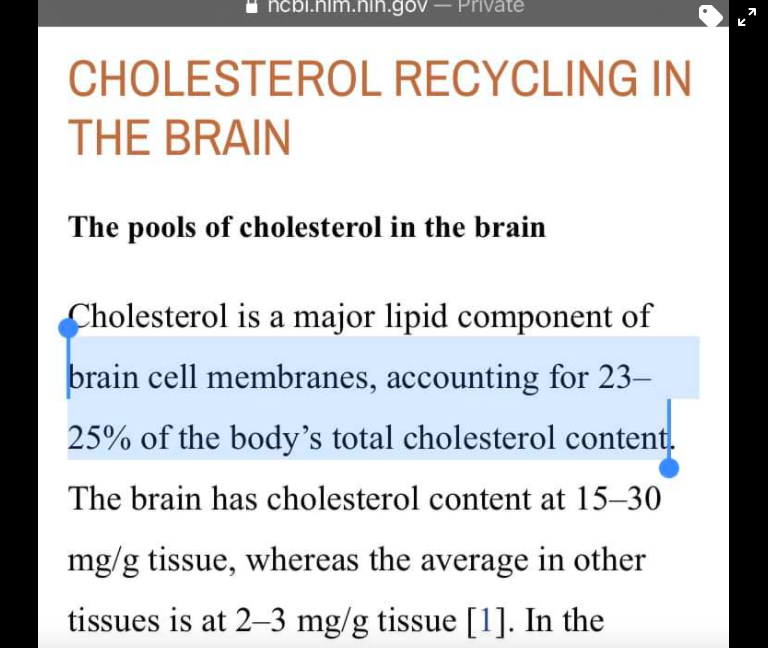|
Unfortunately, people often don’t think about the fact that drugs taken for any reason (including cardio-protective) will exert an impact on brain cells. And sadly, epidemiological studies obscure the known mechanistic downside. Headlines read, “statins, which lower risk of stroke, associated with cognitive IMPROVEMENT.” Yes, NOT-having-a-stroke is probably helpful for the brain. No one would argue otherwise. But look closely. This is a very slyly stated and question-begging logical fallacy. Not-having-a-stroke is helpful for the brain. This doesn't say anything about the OTHER ways we know statins impact brain cells. Brain cell membranes are made of cholesterol: There is absolutely no scientific substantiation for the belief that disrupting cholesterol in the body will not have an adverse neurological impact. It would be like concluding that guns are brain protective, because the manufacturing of firearms takes a lot of engineering capability, and, therefore, their production develops the learning centers of the brain. It's a distracting truth which has zero bearing on the cost-benefit analysis anyone cares about.
https://www.ncbi.nlm.nih.gov/pmc/articles/PMC4837572/. Brain cells are more reliant on an abundance of cholesterol than nearly any other tissue in the body. This isn’t news. There are calcium channels and beta receptors in many organs, not just the heart. Diuretics taken to reduce the effort of the heart will also alter electrolyte management throughout the whole body. Since the 90s, there has been a good body of evidence that high blood pressure medications accelerate cognitive loss: https://www.eurekalert.org/.../1997-12/WFUB-NCCB-021297.php Sadly, when friends and family members are experiencing cognitive impairment, almost never do people consider the very simple experiment of REMOVING medications to define their role in the cognitive impairment. Why get healthier to improve biomarkers, when you can just take a drug to cheat the test and change a symptom? Even though most individual medications carry a risk (just read the label) of headache, dizziness, memory loss, and disorientation, somehow we don’t stop to think how multiple drugs taken for years or decades SHOULD give somebody severe neurological damage. Risk is leveraged on a timeline. A short duration of one drug carries low risk. The longer and greater number of drugs, the more assured the risk is. Well-meaning clinicians and intelligent readers everywhere get confused by artfully-crafted headlines and studies whose objective is specifically to convince the readers that these drugs are not only safe but will secondarily or tertiarily confer BENEFIT, even though their known mechanism is the direct inhibition of brain cells function. Be on the lookout. People will cite age or family heredity long before considering medications as a possible cause. And what a silly thing to happen, when those same medications have labels which include the very symptoms we might call “Alzheimers” and “dementia."
0 Comments
Your comment will be posted after it is approved.
Leave a Reply. |
Elev8 Wellness
|
LIVE. AWESOME.We offer the highest quality in personal fitness, nutrition, and mindset coaching, helping you achieve your fitness, health, wellness and performance goals no matter the obstacle. With virtual online training and private, in-studio training we make it easier to reach your wellness goals safely.
No more can't. No more not good enough. If you compete in a sport, let your mind no longer hold you back from being the greatest. If you don't, let your mind no longer hold you back from being the best version of you that you can be. Sign-up for a Tour Covid Screen Waiver Elev8 Waiver Become an Elev8 Instructor Space Rental |
6244 lyndale ave. s., minneapolis, mn 55423
|
© 2021 Elev8 Wellness LLC. All Rights Reserved. site map | contribute | SITE BY Sproute Creative


 RSS Feed
RSS Feed
